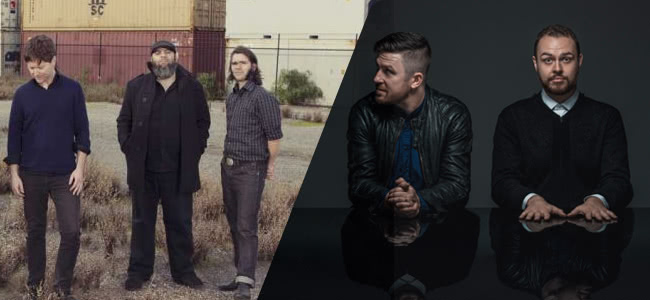There’s not doubt that technology is constantly redefining the way artists create and collaborate. This Thursday the 4th June, as part of Vivid Sydney, and presented by Dropbox, James Lyell and Hugo Gruzman (Flight Facilities), Glenn Richards (Augie March), Mikah Freeman and Vance Musgrove (The Aston Shuffle) and Tim Hardaker (Triple J) discuss the creative process behind some of their biggest hits and explore how technology is helping to bridge distance allowing artists to collaborate around the world to make music together. All info here.
Exploring collaboration and creativity, artists will reveal the process that went into creating some of their biggest hits, how technology has redefined the way musicians create songs, what technologies will be game-changers for musicians, producers and composers, and advice to emerging musicians about using technology to support their career, this would be a must not miss discussion for anyone interested in the future of music an technology.
In the lead up to the event, we chatted to Glenn Richards of Augie March and the duo behind the The Aston Shuffle on how technology has affected their creativity. The panel kicks off agh 11am, for more info visit www.vividsydney.com.
How Tech Developments Have Changed The Songwriting Process
Glenn Richards [Augie March]: “Briefly, I moved to Hobart about four years ago and started writing for another Augie March album. Over that four years I was able to upload and download files in a fashion that virtually replaced our traditional pre-production process. Of course this then extended to me being able to put together an entire album while only visiting the mainland for a few days at a time where live ensemble playing was genuinely required.”
The Aston Shuffle: “Our workflow for making music is constantly changing with technology. Computers are a huge part of doing what we do as electronic musicians, and as computers get cheaper & more powerful, there’s a lot of things we only ever used to dream about being able to do that are now really easy.
These days a middle-of-the-road laptop is a fully capable production, mixing and mastering tool and that’s pretty exciting. We’re nerdy guys and always looking for cool new stuff, so seeking out and learning about new music tech developments is a big way we keep ourselves on our toes creatively, and find new sources of inspiration.”
What Tech Development Has Changed Life Most
Glenn Richards [Augie March]: “I doubt many people of my generation would say any different. We were cognisant pre and post internet, the entire world changed.”
The Aston Shuffle: “Overall I’d say the internet has been the technology with the most impact. I remember when I first used the internet and email at school, and when our family first got our (dial up) internet connection, it was mind-boggling to think of all the possibilities the technology would enable, and even in my wildest dreams I would never have imagined we’d end up with smartphones or internet-enabled light bulbs or any of the amazing stuff there is today.
A tool like Dropbox is firmly in that ‘never would have thought this would be possible’ category, it’s amazing how much of a transformative tool it’s been for both the business and creative side of being musicians.”
The Future Of Music & Technology
Glenn Richards [Augie March]: “As with any tech, and at any time in history, there will be a minority who use advancements for good and a majority who use them for evil or, even worse, the banal.
Certainly it’s possible for just about anyone to put together something that resembles music on their phone right now, which is cool and fun but maybe too easy. Taste rules and the majority taste is generally pretty awful, so in the end you’re not going to win – most good human products are the result of strenuous thought and labour, spirit and imagination, this applies to the tech and the art made using the tech.”
Writing The Augie March Record Remotely
Glenn Richards [Augie March]: “It made certain things wonderfully easy and eliminated a good deal of stress and also time and money wasted. The drawbacks were small by comparison.
Private servers for file transfer weren’t new to us so for some years we’d had a degree of tran-domestic and trans-national collaboration, but using something like dropbox was obviously much quicker, much more reliable, and in a sense it approximated a certain sharing of ideas that you’d otherwise only get in a room together with one another.
It didn’t affect the way I write songs, that’s always been a mix of techniques, including within the digital realm, but it did enable quicker appraisals of parts and more thoughtful critiquing. Like, “that’s crap, I’m deleting it, you send me a better one and turn the mic around the right way!” which is an actual email I sent, and I was right. But not very nice.”




































